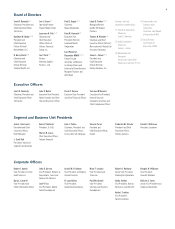E-Z-GO 2010 Annual Report Download - page 20
Download and view the complete annual report
Please find page 20 of the 2010 E-Z-GO annual report below. You can navigate through the pages in the report by either clicking on the pages listed below, or by using the keyword search tool below to find specific information within the annual report.
8
• Uncertainty in estimating reserves, including reserves established to address contingent liabilities, unrecognized tax benefits
and potential losses on TFC’s receivables;
• Difficult conditions in the financial markets that may adversely impact our customers’ ability to fund or finance purchases of
our products; and
• Continued volatility in the economy resulting in a prolonged downturn in the markets in which we do business.
Item 1A.
RISK FACTORS
Our business, financial condition and results of operations are subject to various risks, including those discussed below, which may
affect the value of our securities. The risks discussed below are those that we believe currently are the most significant, although
additional risks not presently known to us or that we currently deem less significant also may impact our business, financial condition
or results of operations, perhaps materially.
We have customer concentration with the U.S. Government.
During 2010, we derived approximately 34% of our revenues from sales to a variety of U.S. Government entities. Our ability to
compete successfully for and retain U.S. Government business is highly dependent on technical excellence, management proficiency,
strategic alliances, cost-effective performance, and the ability to recruit and retain key personnel. Our revenues from the U.S.
Government largely result from contracts awarded to us under various U.S. Government defense-related programs. The funding of
these programs is subject to congressional appropriation decisions. Although multiple-year contracts may be planned in connection
with major procurements, Congress generally appropriates funds on a fiscal year basis even though a program may continue for
several years. Consequently, programs often are only partially funded initially, and additional funds are committed only as Congress
makes further appropriations. The reduction or termination of funding, or changes in the timing of funding, for a U.S. Government
program in which we provide products or services would result in a reduction or loss of anticipated future revenues attributable to that
program and could have a negative impact on our results of operations. Significant changes in national and international priorities for
defense spending could impact the funding, or the timing of funding, of our programs, which could negatively impact our results of
operations and financial condition.
U.S. Government contracts may be terminated at any time and may contain other unfavorable provisions.
The U.S. Government typically can terminate or modify any of its contracts with us either for its convenience or if we default by
failing to perform under the terms of the applicable contract. A termination arising out of our default could expose us to liability and
have an adverse effect on our ability to compete for future contracts and orders. If any of our contracts are terminated by the U.S.
Government, our backlog would be reduced, in accordance with contract terms, by the expected value of the remaining work under
such contracts. In addition, on those contracts for which we are teamed with others and are not the prime contractor, the U.S.
Government could terminate a prime contract under which we are a subcontractor, irrespective of the quality of our products and
services as a subcontractor. In any such event, our financial condition and results of operations could be adversely affected.
As a U.S. Government contractor, we are subject to a number of procurement rules and regulations.
We must comply with and are affected by laws and regulations relating to the formation, administration and performance of U.S.
Government contracts. These laws and regulations, among other things, require certification and disclosure of all cost and pricing data
in connection with contract negotiation, define allowable and unallowable costs and otherwise govern our right to reimbursement
under certain cost-based U.S. Government contracts, and restrict the use and dissemination of classified information and the
exportation of certain products and technical data. Our U.S. Government contracts contain provisions that allow the U.S. Government
to unilaterally suspend us from receiving new contracts pending resolution of alleged violations of procurement laws or regulations,
reduce the value of existing contracts, issue modifications to a contract, and control and potentially prohibit the export of our products,
services and associated materials. Several of our U.S. Government contracts contain provisions that mandate us to disclose whether or
not we have been the subject of a proceeding that resulted in a criminal conviction, based on certain statutes, certain findings of civil
liability, and certain administrative determinations of fault or a settlement with an acknowledgment of fault in connection with the
performance of a government contract. Failure to properly and timely disclose may result in a termination for default or cause,
suspension and/or debarment, and potential fines. In addition, we are subject to audits by the Defense Contract Audit Agency to
assure our compliance with the laws and regulations applicable to U.S. Government contractors. A violation of specific laws and
regulations could result in the imposition of fines and penalties or the termination of our contracts and, under certain circumstances,
suspension or debarment from future contracts for a period of time. Also, changes in procurement policies, budget considerations,
unexpected U.S. developments, such as terrorist attacks, or similar political developments or events abroad that may change the U.S.
Government’s national security defense posture may affect sales to government entities. These laws and regulations affect how we do
business with our customers and, in some instances, impose added costs on our business.
The Department of Defense (DoD) has announced plans for significant changes to its business practices that could have a material
effect on its overall procurement process and adversely impact our current programs and potential new awards.
Recently, the DoD has announced various initiatives designed to gain efficiencies, refocus priorities and enhance business practices
used by the DoD, including those used to procure goods and services from defense contractors. The most recent initiatives are
























